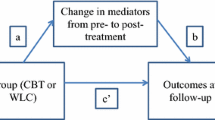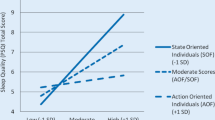Abstract
This research examined the role of cognitive factors (attributions about the causes of sleep difficulties and presleep cognitive activity) in sleep-onset insomnia. Thirty-four subjects, including 13 mild to extreme insomniacs, were interviewed and then spent 5 consecutive nights in a sleep laboratory. In a multiple regression paradigm predictor measures included attribution ratings of sleep difficulty, perceived control of presleep cognitions, presleep cognitive content, and affect associated with presleep cognitions. Criterion measures included laboratory measured objectives and subjective sleep-onset latency, a score presenting the difference between objective and subjective laboratory measures of sleep-onset latency, interview-measured subjective sleep-onset latency, and degree of overall concern and presleep concern about initiating sleep. The results of multiple regression analyses suggested that the content of presleep cognitions and the attributions of sleep difficulties were significantly associated with several subjective measures of sleep-onset latency or concern with initiating sleep. None of the predictor measures was significantly associated with objectively measured sleep-onset latency. Implications for cognitive theories of sleep-onset insomnia and for the psychophysiologic-subjective dimension of insomnia are discussed.
Similar content being viewed by others
References
Ascher, I. M., and Efran, J. S. (1978). Use of paradoxical intention in a behavioral program for sleep onset insomnia.J. Consult. Clin. Psychol. 46: 547–550.
Bixler, E. O., Kales, A., Leo, L. A., and Slye, E. A. (1973). A comparison of subjective estimates and objective sleep laboratory findings in insomnia patients.Sleep Res. 2: 143.
Bootzin, R. R., Herman, C. P., and Nicassio, P. (1976). The power of suggestion: Another examination of misattribution and insomnia.J. Personal. Soc. Psychol. 34: 673–679.
Borkovec, T. (1979). Pseudo (experiential) insomnia and idiopathic (objective) insomnia: Theoretical and therapeutic issues. In Eyseneck, H. J., and Rachman, S. (eds.),Advances in Behavior Research and Therapy, Pergamon Press, London.
Borkovec, T., Grayson, J., O'Brien, G., and Weerts, T. (1979). Relaxation treatment of pseudoinsomnia and idiopathic insomnia: An electroencephalographic evaluation.J. Appl. Behav. Anal. 12: 37–54.
Carskadon, M., Dement, W., Mitler, M., Gulleminault, C., Zarcone, V., and Spiegel, R. (1976). Self-reports versus sleep laboratory findings in 122 drug-free subjects with complaints of chronic insomnia.Am. J. Psychiat. 133: 1382–1387.
Coates, T. J. (1981). Recent advances in the description and treatment of insomnia.Behav. Med. Update 3: 15–19.
Coursey, R. D., Buchsbaum, M., and Frankel, B. L. (1975). Personality measures and evoked responses in chronic insomniacs.J. Abnorm. Psychol. 84: 239–249.
Davison, G. C., Tsujimoto, R. N., and Glaros, A. G. (1973). Attribution and the maintenance of behavior change in falling asleep.J. Abnorm. Psychol. 82: 124–133.
Dement, W. W. (1972).Some Must Watch While Some Must Sleep, W. H. Freeman, San Francisco.
Elig, T. W., and Frieze, I. H. (1975). A multi-dimensional scheme for coding and interpreting perceived causality for success and failure events: The coding scheme of perceived causality (CSPC).JSAS Cat. Select. Doc. Psychol. 5: 313.
Frankel, B. L., Coursey, R. D., Buchbinder, R., and Synder, F. (1976). Recorded and reported sleep in chronic primary insomnia.Arch. Gen. Psychiat. 33: 615–623.
Haynes, S. N. (1981).Principles of Behavior Assessment, Gardner Press, New York.
Haynes, S. N., and Wilson, C. C. (1979).Behavioral Assessment: Recent Advances in Concepts and Methods, Jossey-Bass, San Francisco.
Haynes, S. N., Sides, H., and Lockwood, G. (1977). Relaxation instructions and electromyo-graphic biofeedback intervention with insomnia.Behav. Ther. 8: 644–652.
Haynes, S. N., Adams, A. E., and Franzen, M. (1981). The role of presleep stress in sleep-onset insomnia.J. Abnorm. Psychol. 90: 601–606.
Haynes, S. N., Adams, A., West S., and Kamens, L. (1982). The stimulus-control conceptualization of sleep-onset insomnia: A reexamination.J. Psychosom. Res. 26: 333–339.
Hefler, D., and Lisman, S. (1978). Attribution and insomnia: A replication failure.Psychol. Rec. 28: 123–128.
Hurlburt, R. (1979). Random sampling of cognitions and behavior.J. Res. Personal. 13: 103–111.
Kellogg, R., and Baron, R. (1975). Attribution theory, insomnia, and the reverse placebo effect: A reversal of Storms and Nisbett's findings.J. Personal. Soc. Psychol. 32: 231–236.
Kerlinger, F., and Pedhazur, E. (1973).Multiple Regression in Behavioral Research, Holt, Rinehart, & Winston, New York.
Klinger, E. (1978). Modes of normal conscious flow. In Pope, D. S., and Singer, J. L. (eds.),The Stream of Consciousness: Scientific Investigations into the Flow of Human Experience, Plenum, New York.
Lichstein, K. L., and Rosenthal, T. L. (1980). Insomniacs' perception of cognitive versus somatic determinants of sleep disturbance.J. Abnorm. Psychol. 89: 105–107.
Mitchell, K. R. (1979). Behavioral treatment of presleep tension and intrusive cognitions in patients with severe predormital insomnia.J. Behav. Med. 2: 57–69.
Mitchell, K. R., and White, R. (1977). Self-management of severe predormital insomnia.J. Behav. Ther. Exp. Psychiat. 8: 57–63.
Rechtschaffen, A., and Kales, A. (eds.) (1968).A Manual of Standardized Terminology, Techniques, and Scoring Systems for Sleep Stages of Human Subjects. National Institutes of Health Publication 204, U.S. Government Printing Office, Washington, D.C.
Starker, S., and Hasenfeld, B. (1976). Daydream styles and sleep disturbance.J. Nerv. Ment. Dis. 163: 391–400.
Storms, M., and McCaul, K. (1976). Attribution processes and emotional exacerbation of dysfunctional behavior. In Harvey, J., Ickes, W., and Kidd, R. (eds.),New Directions in Attribution Research, Lawrence Erlbaum Associates, Hillsdale, N.J.
Storms, M., and Nisbett, R. (1970). Insomnia and the attribution process.J. Person. Soc. Psychol. 16: 319–328.
Tinsley, H., and Weiss, R. (1970). Interrater reliability and agreement of subjective judgements.J. Consult. Clin. Psychol. 16: 319–328.
Weiner, B. (1974).Achievement Motivation and Attribution Theory, General Learning Press, New York.
Youkilis, H., and Bootzin, R. (1981). A psychophysiological perspective on the etiology and treatment of insomnia. In Haynes, S., and Gannon, L. (eds.),Psychosomatic Disorders: A Psychological Approach to Etiology and Treatment, Praeger Press, New York.
Author information
Authors and Affiliations
Additional information
The authors would like to express their appreciation for the assistance provided by Wade Horn, Linda Gannon, Paula Heiser, Sarah Dickson, Kathy Kyndberg, A. E. Adams, IV, and Bill Hoffman.
Rights and permissions
About this article
Cite this article
Van Egeren, L., Haynes, S.N., Franzen, M. et al. Presleep cognitions and attributions in sleep-onset insomnia. J Behav Med 6, 217–232 (1983). https://doi.org/10.1007/BF00845382
Accepted:
Issue Date:
DOI: https://doi.org/10.1007/BF00845382




